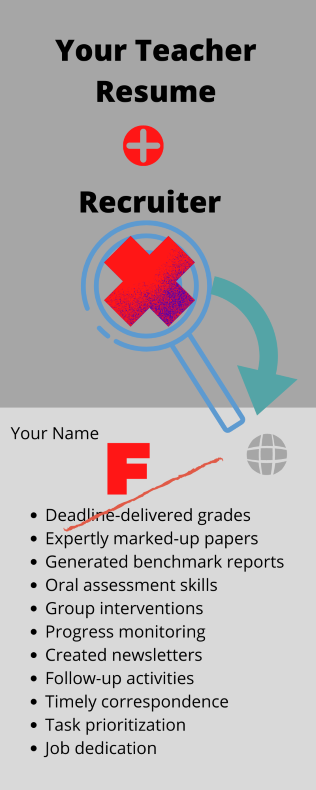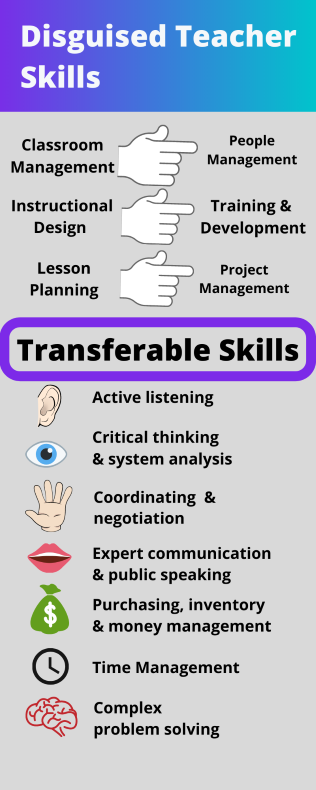
“Teachers have no industry transferable skills.”
-Random Recruiter
Unaware of this recruiter assumption? You’re about to become educated.
A burly man interrupts your interview. The white button-down sleeve couldn’t hide his huge blue-green tattoo. His buzz cut blonde hair clashes with his sharpened blue eyes locked onto your resume.
“So,”
He skips your name.
“You’ll meet our quotas?”
“Absolutely.”
“You’re certain?”
“Think I won’t make them?”
“I didn’t say that.” He cloaks his suspicion.
This smug interrogation lasts seconds. But its scars fester.
Unproductive?
He saw teacher on your application.
Hey, your teaching skills are helpful, not harmful. Let’s reclaim your advantage.

The Problem
Bottom line. You work with kids. Employment agencies see you as a high-paid babysitter. They also think you’re inefficient if you bring work home.
With them, you can’t win.
That means…

Each of the above count for nothing.
Remember, you’ve got no marketable skills. Your resume is a single-dimensional pigeon-holed prison.
Headhunters only see you as the incarnation of your last job title.
Their algorithms are loaded to keep your resumes and applications from reaching their well-paying clients.
Changing Tides
Lezlie Garr, a career coach specialist, uses science to help you find your next position fast. She’s the queen of keyword searching. Here’s her recent, Linked-In post. She stands proud defending your value.
𝗔𝗧𝗧𝗘𝗡𝗧𝗜𝗢𝗡 employers, recruiters, hiring managers & whoever else needs to hear this:

So, when someone says they are/were a teacher, what they ACTUALLY mean is: I am a leader in training and development, performance improvement, and project management. As an effective organizational influencer, I have an innate ability to build, motivate, train, and develop high-performance teams.
OR
I am an effective communicator who is exceptionally skilled at explaining complex principles and concepts in an easily understandable way. I’m also a creative problem solver who effectively develops working relationships across teams and can quickly adapt to shifting priorities to achieve objectives. A little louder this time, TEACHERS HAVE TRANSFERABLE SKILLS.
-Lezlie Garr
Skeptics
A commenter tacked on a thread to Garr’s reclamation of the teacher’s skill advantage. Soon, the stereotypes of teachers surfaced. The thread rejected the idea that lesson planning was project management.
More post responses argued classroom management doesn’t equal people management. These skeptical comments disregarded many of the teachers’ abilities. Commenters scoffed at educator environmental organization skills, conflict resolution practice, and negotiation prowess.
Finally, the thread reached a conclusion, teaching is an easy field.
So, the odds are against you. Your future employer won’t understand your student demographics. Nor will they comprehend how you met these complex needs.
They haven’t seen the individually designed modifications in action. They didn’t note the tweaks in your plan that helped all students be successful.
They didn’t see the harmony of the ELL, SPEd, 504, and at-risk populations or their seamless cooperation in your class activities. This is unrecognizable to them.
The corporate world can’t relate to your daily classroom interruptions either. They can’t imagine the crises you resolve with two seconds of your time. Think of the organizational demolition zones you avoided by your careful planning.
Skeptics discredit assessment skills altogether. They can’t fathom the psychology you used. This includes the relieved class test performance anxieties and the bolstered student motivation levels. Lest we forget the environment of classroom camaraderie.
Skeptics look at dollar signs. Money equals importance. Comments on Garr’s thread claimed money revealed task difficulty status. Monitoring delegated multi-million-dollar projects are ‘hard work’.
That’s supervising teams, right? Is that high-class babysitting?
My experience of upper management reveals these professionals either watch or lead. This is the supervisor’s decision, but not a teacher’s. Teachers must always lead.
So, new, potential employers will focus on productivity. How will you, as their employee, add to the efficiency of their business?

Knowing the Process
Translations
“One of the main lessons that I teach is describing yourself as a professional, and it helps teachers develop mindset shifts to overcome some of these mental hurdles that we place on ourselves.”
-Daphne Williams, Teacher Career Coach
So, your teaching resume needs transformation.
Accomplishments need an outcome presentation. You can glean this much from a recruiter. How many papers do you grade in an hour? Great start. But what if you could get that down to words edited per hour?
Also, your resume must allude to soft skills by focusing on the outcomes. Conflict resolution is big in customer service fields. As a teacher, you’re resolving repetitive conflicts. Still, you need to add associated numbers to these skills on your resume. This is what recruiters call a results-driven resume.
Listening ability, meeting deadlines, conflict resolution skills aren’t thought of as quantifiable. Yet they are if you get creative. Later, be sure to zoom in on showing these soft skills off in the in-person or electronic interview.
Presentation
“You really want to start building out that digital resume that you can refer to with your experience and showcase your work on your website.”
-Daphne Williams, Teacher Career Coach
Erase an employer’s hiring hesitancy by displaying a skill-related portfolio. Attach samples in it to show what you will produce for them. Plus, invest in direct marketing on all social media platforms. That way, you’re a personality behind a resume.
And once you apply for an opportunity, follow a business’s Linked In, Twitter, or Facebook page. Include your authored training guides, lesson units, and the software applications you used in your posts when it really connects with the problem they’re discussing. Show employers online that your skills are invaluable.
Face it. Leave the teaching profession, and you’ll run into doubters. They will question your smooth transition to a new career. So, survey all your skills and then promote them on websites or platforms like Linked-In. Remember, think professional.
Strength Survey
Brilliant aptitudes and career interest tests match your gained skills with possible careers. Transferable skills add value. But knowing your strengths reveals the weaknesses within them. You may be a master in your craft, but say you disregard marketing. Well, that’s a concern. So, be ready to shore up your weak skill areas with some free or inexpensive training.
You can reach a friend or counselor and find a website to help discover your strengths. This SDS test is now free. Many will find its display of colorful graphics useful. These categorized presentations make insightful quiz results accessible for a successful search experience. (Note stay away from the recruiter-based free aptitude tests. If an employment agency is a sponsor or advocate, beware.)
Soul Searching
With this career change, you must focus on your tastes and interests. This is a chance for some of you to start your career path from the beginning.
Staying in education or ready for a new direction?
Do the research and discover what it takes to refine your talents.
Take note if your career interest needs more education. This may be a reality. In today’s business world, going out to get a job to survive makes little sense to employers.
Here’s the shocking news. Teachers teach because they like a challenge. That need for rigor in your work won’t vanish.
Low-paying jobs or entry-level jobs may not meet this expectation.
This can result in extreme job dissatisfaction.
Plus, you became a teacher to find career fulfillment. It’s rare that entry-level jobs will meet that expectation. Also, a meaningful, entry-level job with mobility may decrease the money you have to live on. Prepare for that monetary dip before you experience the income surge.
In addition, teaching gave you a position like a ministry that had a higher calling. Your teacher’s heart won’t change. Keep answering the need for impactful teachers but outside the office. Volunteer work is one way you can continue to support vital educational efforts.
Career Coaching
You have many people present on the internet that want to help you. Some will help you without even collecting a fee. They rarely ask for payment until you need their constant expertise.
Teachers in Transition
Kitty Boitnott runs a specialized post-teaching career and mid-career coaching service called Teachers in Transition (TIT). Boitnott is confident she can find you fulfilling careers outside of classroom teaching. She calls teachers her tribe. This former teacher and administrator went the entrepreneur route. According to research, this isn’t uncommon. Teachers are often unsuspecting entrepreneurs.
Teachers in Transition has helped hundreds of clients make new career connections.
TIT strategy is three-fold.
- Survey your desired career field and craft a complementary resume.
- Revamp your Linked In profile and portfolio to fit your desired job description.
- Keep in touch with your coach and newly made connections throughout the job search.
More Than Resume Help
This former music teacher and “entrepreneur by accident” has been in your situation too. Lezlie Garr has also helped hundreds of clients find new vocational homes. Garr’s specialized scientific search method gives you an edge targeting career changes. This data and self-knowledge convert into keywords. Then, Garr adds her own connections. Combine that information with her resume and social media profile revamp. Tadah! Clients find their desired positions.
The Pudding
Research reveals that many people who leave classroom teaching don’t leave education. Some go into business to help teachers with burn-out, technology, and curriculum.
Many former teachers enjoy positions that work together with teachers and students. Net surfing revealed employers supporting the teaching profession hire former classroom teachers the most.
Yet, there are other options outside of education. Listen for your calling from within during your soul-searching phase. Develop your talents. That’s the root of your vocational journey.
The switch from teaching to corporate training is not an easy one to make. That’s why the portfolio is essential. Employers want to plug people into positions fast, not train them.
So, if you’re missing the desired software experience, you’re disqualified. To avoid that, you may need to get pro bono gigs in your desired industry using that specialized software.
Also, to get you ready for the highs and lows of the job search experience, take advantage of peer groups.
Posting a question on one of these social networking boards is productive. People want to guide you to problem-solve through the transition process. Reaching out to experts is always an option. It’s true. The worst thing they can do is ignore your cry for help.
Wrapping Up
Plan to Reclaim Your Advantage by following these steps:
1. Survey skills
2. Soul search
3. Results-driven resume
4. Reconnect with networking
5. Seek career coaches
6. Add new training
7. Ask for support
Stick with the plan and before long you’ll be in a new transition period. But, let’s save this for another post. Until then, keep being your top-shelf you.
If you have other questions or topics, you’d like me to explore, let me know below. If you found this post helpful, please like or share it.
Also, sign up for my freebie How to Create Media Like a Pro. Get links to valuable tech skills that help you create your brand of media. Plus, get connected for more posts like this one.
